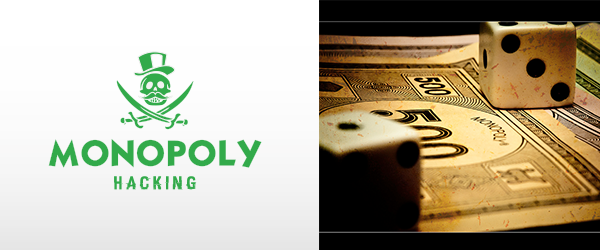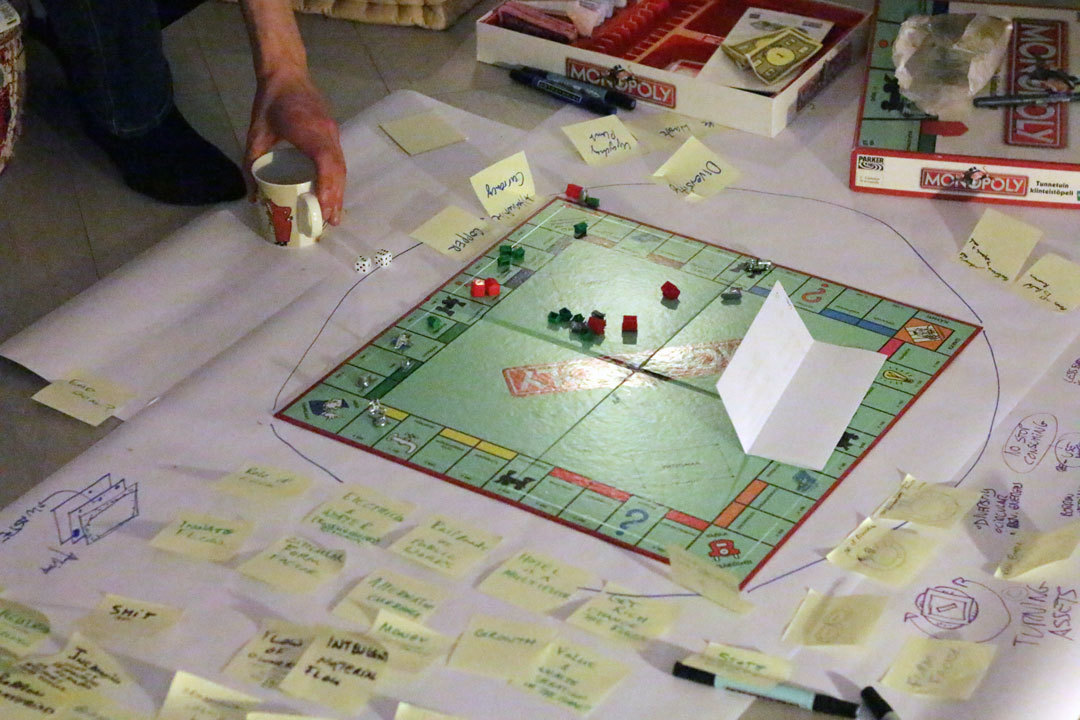Here’s some documentation from our initial sessions:
Overview:
Our initial workshop (on wednesday 10th) for OSCEdays 2015 Helsinki, was lively and intense, but resulted in vague ideas about potential Monopoly game hacks that could showcase the circular economy. The Monopoly format itself, seemed to lack much in the way of substance or mechanics which related to elements that could be tweaked to create a circular economic model. Also, timing was just to tight and the task of game design was too difficult for one session.
In the end, we did succeed in analysing the nature of the game, and getting orientated to some basic circular economic concepts. Through this process the team managed to synthesised some insights, which were used as inspiration in informal second day of development between some of the participants. At the end of this session we created a rough version of a game to concept during the second official workshop (Saturday 13th, 2015).
Participants: We had inputs from different perspectives, as our participants had backgrounds ranging within the spectrum of design, industrial ecology, architecture, and economics.
What happened:
We started the session by analyzing monopoly: exploring aspects of how it models capitalistic paradigms, describing speculation and issues around money and power.
We then started to orientate our selves to circular economic ideas, by exploring related media as well as well as specific cradle to cradle design philosophies. This included a review of:
We then attempted to come to a consensus on the end goal for the workshop, outlined as:
-
- Generating interesting discussions first and for most.
-
- Using of monopoly as a loose starting point…
Questions about using Monopoly as a starting point arose:
-Through our earlier discussions it had become apparent that the traditional Monopoly format is maybe not the most fitting model by which we could explore circular economic concepts. So we did discuss to what extent we wanted to stick to the monopoly format, or if it might be better to create something more radical. Arguments came from participants advocating for both sides:
Pros of using Monopoly: everyone in our generation understands it. We would not have time to create quality game if we start from scratch instead.
Cons of sticking to Monopoly: We risked getting stuck on a format which maybe couldn’t explain the circular economy, and in fact might just confuse the message. In this respects, by hacking monopoly too directly, we risked adding too many constraints to our own game concepting.
At this impasse we decided that Monopoly was good for getting inspired and generating discussion. and we chose to hack it with open minds.
Our Analysis of Monopoly:
Our understanding of the different elements of the traditional monopoly format
Dice - Add an element of CHANCE/luck (first one to the land spot with money)
Money - Seen as a required resource and direct means of exchange
Propery cards (deeds) - proof of ownership
Houses & Hotels - represent infrastructure development - application of resources - building multiple houses has multiplier effect on returns (exponential)
Playing pieces - Flow/driv through the board. Could represent individual movement in life (the movers and shakers driving along the highway of life). These pieces only work in relation to the dice, and mark out players abstract movements (marker for where CHANCE/luck has taken each player)
Chance (cards) - another element of chance
Community chest (cards) - have community vibe that represents how free market systems could be diffused through social/public policy. IT’s not always negative, but can be. Like the Chance cards, there is an element of CHANCE/luck
Banker - keeps money - provides a service
Land - Monopolize the entire economic chain
Railroads - Increase in value if you get more and create a chain of infrastructure - this aspect could be leveraged in different way with other properties in our game.
Public works - Can be privatised - have special rules.
Central concepts in Monopoly:
Production & Luck & Private Ownership & Wealth accumulation/power - is part of the original game
Collaboration & Waste : are not aspects of the traditional game
Resource use - comes only in form of currency use in the traditional game.
Chance - is a dominant aspect of monopoly game play. (in circular economy perhaps it could relate to natural phenomena? availability of resources)
Outputs:
We did isolate some interesting aspects of the circular economy concept that could inspire others working to generate game mechanics.
Vague Initial Concepts
- Dealing with the extraction and processing of resources (perhaps having mining as a game element)
- Having an element of waste and production (Waste was a strong discussion point for our participants)
- Questioning the role of money, and considering alternatives (e.g. two kinds of money? local and global etc.)
- Including an element of renewable resources (e.g. sun/energy credits instead of money)
3 possibly conceptual starting points
- Game could deal with transition from a linear economy…to circular economy
- Game could simply be operating in an ideal/functional circular economy throughout the entire game.
- Game could be based on the previous, but could include an aspect of growth within the circular economy framework.
More Concepts:
- Time shift… over the course of gameplay, assets could become liabilities
- Bringing in elements of shared ownership (or shifting ownership)
- The game could aim to promoting an intelligent flow of resources.
- promoting collaboration
- dump of houses, commodities over time
- showcase/follow the product life cycle
Visual/form factor models
- circular form factors.
- double sphere model (biosphere and technosphers ala cradle to cradle)
- multiple game boards on top of each other to represent a temporal component.
Informal Second Day of Ideation
Although intense and inspirational, our initial workshop resulted in very rough concepts, so an informal second day of development was needed in order to generate more defined game and prototype.
Through further discussion and synthesis, we now have a partially developed game concept!
Initial Synopsis of our game concept so far:
Objective:
- All players need to collaborate to build/develop the infrastructure for a 100% circular economy.
- The game board abstractly represents a circular economy. We chose to use a circular monopoly board layout; potentially colour coded to represent the Bio-sphere (green squares) and Techno-spheres (blue squares).
The Proposed game board to be tested tomorrow:
Circlopoly Board stndrd.pdf (345.2 KB)
Circlopoly Board GreenBlue.pdf (344.2 KB)
- Infrastructure development is a multistage process as raw materials (green house pieces) need to be extracted from the mine (bank in classic monopoly), and then converted into finished goods (Hotels replacing house on the board).
- During the initial extraction process, waste is also created and represented by Hotels placed in the ‘landfill’ in the center of the board.
- Extraction requires energy/resources, which are renewable only in the circular economy. This is represented in the game with “Energy Credits” (what used to be Money in classic Monopoly) collected every time users pass “Go”.
- Waste (the hotels in the landfill) need to be used to create finished goods on the board (hotels)
- We aim to replace “Community chest” and “Chance” cards with “Techno” and “Bio” cards, which will be used to highlight details of circular economy thinking.
That’s as far as we’ve gotten in two days… we will try to prototype this all tomorrow.





